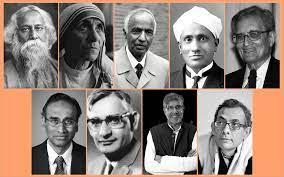From Rabindranath Tagore to Abhijit Banerjee, Meet Indians Who Won Nobel Prize

In pictures: Indian Nobel Laureates
Indian Nobel Laureates: The Nobel Prizes award week for 2021 began on Monday, and everyone is eager to find out who will be the recipient of this year's honour. The Nobel Prize in physics, chemistry, literature, peace, physiology or medicine, and economics has been given since 1901 for excellent achievement in these disciplines.
There have been ten Indian Nobel prize winners so far, ranging from Rabindranath Tagore in 1913 to Abhijit Vinayak Banerjee in 2020. Last year, Abhijit Banerjee was awarded the Nobel Prize in Economics for his exceptional contributions to economics.
The names of Indians who made it to the list of the most distinguished award winners are listed below.
Rabindranath Tagore (1913)

Rabindranath Tagore received the Nobel Prize for Literature in 1913, making him the first Indian to do so. He was given the prize for "his profoundly sensitive, fresh and beautiful verse, by which, with consummate skill, he has made his poetic thought, expressed in his own English words, a part of the literature of the West".
Sir Chandrasekhara Venkata Raman (1930)

CV Raman was India's first Nobel Laureate in Physics, receiving the award in 1930 "for his work on light scattering and the discovery of the effect named after him."
Har Gobind Khorana (1968)

Har Gobind Khorana's work on electron diffraction earned him the Nobel Prize in Physiology or Medicine in 1968. "For their interpretation of the genetic code and its function in protein synthesis," he shared the prize with Robert W Holley and Marshall W Nirenberg.
Mother Teresa (1979)

In 1979, Mother Teresa became the first Indian woman to receive the Nobel Peace Prize. She is well-known for her humanitarian work. In 2003, she was canonised, and Pope Francis made her a saint in 2016.
Subrahmanyan Chandrasekhar (1983)

In 1983, he was awarded the Nobel Prize in Physics for "theoretical studies of physical processes relevant to the structure and evolution of stars." William Alfred Fowler and he shared the prize.
Amartya Sen (1998)

Amartya Sen, an economist, was awarded the Sveriges Riksbank Prize in Economic Sciences in 1998 "for his contributions to welfare economics".
VS Naipaul (2001)

VS Naipaul was awarded the Nobel Prize in Literature in 2001 for his outstanding work and "for having united perceptive narrative and incorruptible scrutiny in works that compel people to see the presence of suppressed histories in works that compel people to see the presence of suppressed histories." He has won several accolades, including the 1971 Booker Prize for his novel In a Free State and the Trinity Cross, Trinidad and Tobago's highest honour, in 1989.
Venkatraman Ramakrishnan (2009)

The Nobel Prize in Chemistry was awarded to Venkatraman Ramakrishnan (L) in 2009 "for studies of the structure and function of the ribosome". He was nominated alongside Thomas A Steitz and Ada E Yonath for the prize.
Kailash Satyarthi (2014)

In 2014, Kailash Satyarthi was awarded the Nobel Peace Prize alongside Malala Yousafzai "for their struggle against the suppression of children and young people, and for the right of all children to education."
Abhijit Vinayak Banerjee (2020)

Abhijit Vinayak Banerjee, his French-American wife Esther Duflo, and fellow American economist Michael Kremer were awarded the Nobel Prize in Economics in 2019 for their "experimental approach to alleviating global poverty."





